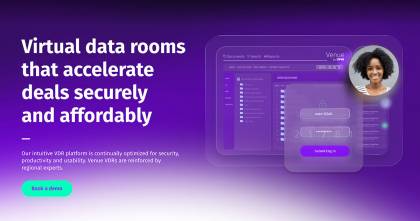Control and security
Most of us are familiar with file sharing sites, having used them in our personal lives.
These services allow users to create, store and share files in a cloud-based repository that syncs in real-time across all devices. Users have some control over who can access, share, download and edit files, but that’s mostly where the control starts and stops.
With a secure data room, not only can you grant access to internal or external members based on a wide range of permissions, but you can also have constant oversight into who is viewing each file in real-time. As well, you can generate audit reports that show user interactions and leverage templates to create customized contracts like service agreements or non-disclosures.
Disadvantage of Dropbox and other file sharing sites is that their security is often sub-par. A quick internet search finds them especially susceptible to hacks. While you might be willing to take a chance on your vacation photos, compromising your business documents can be devastating. Accenture predicts that cybercrime will cost businesses $5.2 trillion in the next five years, and small-to-medium sized businesses don’t skirt hackers’ attention. In fact, 43 percent of attacks target smaller organizations, and 60 percent of those companies go out of business within six months of the incident.
The good news? When it comes to purposefully granting access, keeping files properly versioned and shielding them from potential threats, VDRs offer the highest security.
Even if you’re not prepping for a public offering, you likely need to do more than just share your information. You need to protect it and use it.
Once information is in the VDR, it’s easy to drag and drop files and rearrange them into a customized system that makes sense for your business, even as it evolves.
For example, DFIN’s award-winning VDR, Venue, offers a corporate repository held to the highest security standards. It’s regularly penetration-tested with third-party evaluations that ensure strict adherence to AT 101 SOC 2 standards and comes with 256-bit AES SSL encryption, watermarking features and automatic virus scanning.
Reduce risk
When talking about the security of critical information, it’s also important to consider the less nefarious threats. Human error, poor organization and incompatible digital tools can create enormous risks for your business. Bad version control, a spilled coffee or failed migration of files can lead to lost information and crippling delays in business.
VDRs act as a valuable tool for keeping your files backed up, properly versioned and well organized so they’re always usable and accessible. Additionally, VDRs are flexible when importing your documents, allowing mountains of information to be quickly and easily migrated from other locations, while maintaining their original filing structure.
Once information is in the VDR, it’s easy to drag and drop files and rearrange them into a customized system that makes sense for your business, even as it evolves. Built-in version control features ensure you’re always working with the most up-to-date documents, and that no progress is ever lost.
Boost your business
Today’s businesses have accumulated a long list of digital tools to meet their various needs. But this gets costly, and too many solutions can be difficult to manage and track. So, it’s worth considering platforms that can do more than a singular task. When looking to add another application, ask yourself: can this fundamentally enhance my organization?
Whether it’s boosting your brand, increasing productivity or generating insights that help you make smarter decisions, many solutions aim to be multi-purpose. VDRs are a good example, whereas file sharing sites are fairly singular.
Consider this: if you’re sharing documents externally, a VDR can be customized with your organization’s brand, projecting a level of corporate sophistication that isn’t offered by a file sharing service.
And, although they’re often marketed as an efficient collaboration tool, file sharing sites don’t really deliver an intelligent way to manage workflow or assign tasks.
Some VDRs, like DFIN’s Venue, have integrated AI, which allows them to streamline processes by sending alerts and action items to team members as files are uploaded or modified. Venue has the smartest machine learning available, which allows for built-in functions like document and contract review, as well as the automation of time consuming tasks like redacting text.
Lastly, one of the greatest benefits of our virtual data room is the instant access to 24-hour assistance and customer support. At DFIN, our experts get to know your business, and can help you solve any number of challenges with personal support — an invaluable benefit in today’s world of chatbots and hold lines.
So, if sharing sensitive documents is on your radar, why not do it smarter, safer and more efficiently with a smartroom VDR like Venue? The reality is that simple file sharing sites no longer suffice. Businesses can’t ignore the features that have become table stakes in today’s digital world: airtight security, customizable control, basic data management, scalability and expert-level customer support.
Even if you’re not prepping for a public offering, you likely need to do more than just share your information. You need to protect it and use it.

